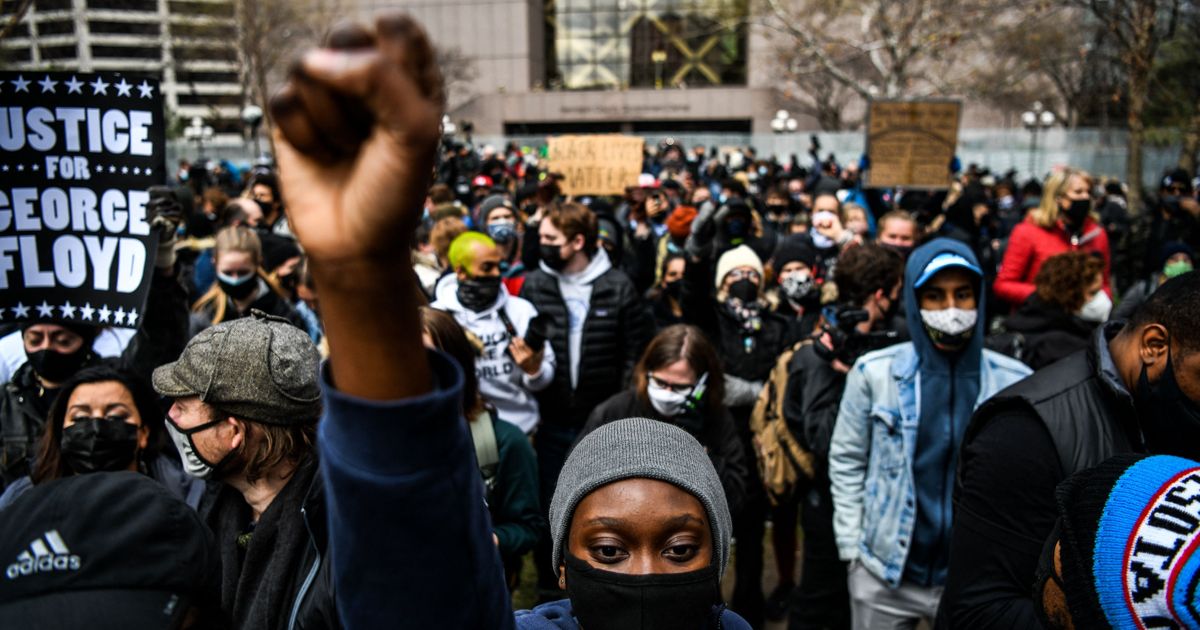
Justice was served Tuesday, but that doesn’t mean America’s justice system isn’t broken.
On Tuesday evening, Derek Chauvin, the former Minneapolis police officer who kneeled on George Floyd’s neck for more than nine minutes in May 2020, was found guilty of second-degree unintentional murder, third-degree murder, and second-degree manslaughter.
The unanimous verdict was delivered to the nation after a jury of 12 people deliberated for more than 10 hours. Viewers at home and people in the streets of Minneapolis breathed a collective sigh of relief upon hearing the verdict, and while many celebrated the long-awaited decision, it was clear for activists that injustice endures, police brutality persists, and no verdict could reverse George Floyd’s death.
Live as the verdict was read and people erupted into cheers and started sobbing when the jury announced Derek Chauvin was guilty of murdering George Floyd pic.twitter.com/FMhpk9oCAN
— Brianna Sacks (@bri_sacks) April 20, 2021
The moment Derek Chauvin was found guilty of murder in the second degree outside Hennepin County Gov Center. He was also found guilty of murder in the third degree, guilty manslaughter on the second degree, and guilty on all counts. pic.twitter.com/PQsIGuXraW
— Caroline Haskins (@caro1inehaskins) April 20, 2021
Politicians including Cory Booker, Elizabeth Warren, Hillary Clinton, Bernie Sanders, and former president Barack Obama were quick to tweet statements in support of the verdict and George Floyd’s family. However, they were sure to stress that this verdict is but a single step in making sure, as Obama stated, every American gets the justice they deserve. Chauvin is the first white police officer in Minnesota to be convicted for killing a Black person.
Today, a jury did the right thing. But true justice requires much more. Michelle and I send our prayers to the Floyd family, and we stand with all those who are committed to guaranteeing every American the full measure of justice that George and so many others have been denied. pic.twitter.com/mihZQHqACV
— Barack Obama (@BarackObama) April 20, 2021
President Biden and VP Harris call the Floyd family after the GUILTY verdict! Thank you @POTUS & @VP for your support! We hope that we can count on you for the police reform we NEED in America! ✊🏾 pic.twitter.com/cg4V2D5tlI
— Ben Crump (@AttorneyCrump) April 20, 2021
Our struggle now is about justice—not justice on paper, but real justice in which all Americans live their lives free of oppression. We must boldly root out the cancer of systemic racism and police violence against people of color.
— Bernie Sanders (@SenSanders) April 20, 2021
George Floyd’s family and community deserved for his killer to be held accountable.
Today, they got that accountability.
Always and forever, Black lives matter.
— Hillary Clinton (@HillaryClinton) April 20, 2021
George Floyd should still be alive – and we must keep fighting to dismantle systemic racism and fundamentally transform our justice system.
— Elizabeth Warren (@SenWarren) April 20, 2021
This verdict is justice served—but it is not justice for George Floyd. True justice would be a country where George Floyd would still be alive today. True justice demands action—it demands change & that we do everything we can to stop this from happening again & again & again.
— Cory Booker (@CoryBooker) April 20, 2021
The efforts, protests, and calls for justice that preceded this verdict were massive and emotionally taxing, journalists and activists noted.
Accountability shouldn’t feel this surreal
— Ryan Brooks (@ryanbrooks) April 20, 2021
Let’s be clear: A just verdict is not the same as justice.
— Maya Harris (@mayaharris_) April 20, 2021
a certain kind of pain in that we all had to wonder
— josie duffy rice (@jduffyrice) April 20, 2021
Notably, legal analysts have spotlighted the state attorney general’s role in the trial, and questioned whether the outcome would be the same if the local district attorney’s office had led the case (local district attorneys tend to have deeper police ties). According to the New York Times, “The facts laid out in the D.A.’s complaint were much more favorable to Chauvin than the attorney general’s case.”
During a press conference after the verdict was read, Rev. Al Sharpton, standing alongside Floyd’s family and their attorneys, said, “We don’t celebrate a man going to jail. We’d rather George be alive.” In just a few days, he added, the funeral of Daunte Wright will take place. The 20-year-old Black man was killed by a police officer during a traffic stop just 10 miles from the courthouse where Chauvin stood trial.
“We still have cases to fight, but this gives us the energy to fight on,” he said.
Police killings are a mental health crisis for Black people, according to a new study published Monday.
This isn’t proof the system works. It’s proof of how broken it is. Because it took us this long, and this much attention. Until we have a world where our communities can thrive free from fear, there will be no justice.
— Black Lives Matter (@Blklivesmatter) April 20, 2021
“Until we have a world where our communities can thrive free from fear, there will be no justice,” Black Lives Matter organization tweeted.
